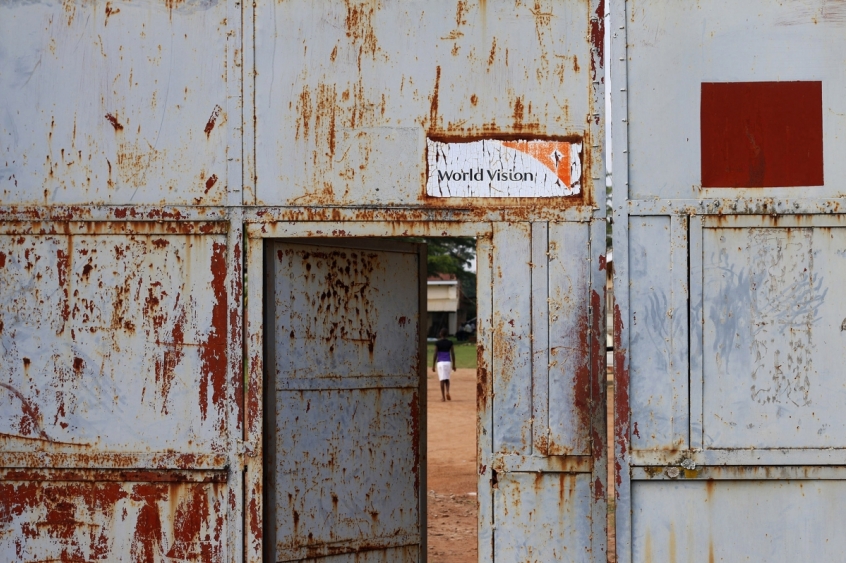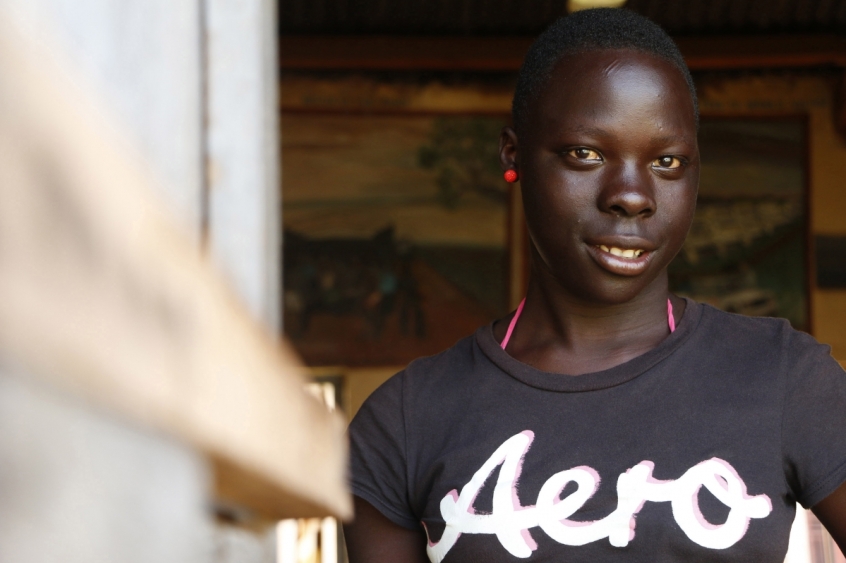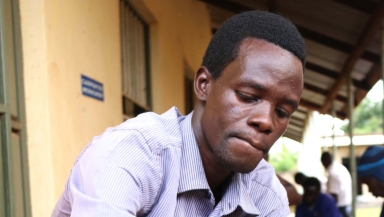
A young woman makes a floral mask for her head during a therapy session in northern Uganda. She is in recovery with the leading Christian charity World Vision after repeatedly being raped amid years of conflict in the region. 'Although we are still struggling, we are hoping that something good will come,' she tells World Vision. 'That is why we put the white flower on the forehead. Flowers [are] small so good, they are beautiful and so people love them. We want to be those flowers.'
The small sign of hope is emblematic of the work being done by World Vision in the region, where the deadly Lord's Resistance Army [LRA] is no longer active but its brutal legacy remains.
Between 1992 and 2005, the LRA, a violent 'Christian' sect, abducted up to 30,000 children from northern Uganda, and every single family across the region was affected by the conflict.
Even years after the violence ended, many former child soldiers cannot return home, as they are ostracised by their communities. Thousands of children were born as a result of sexual violence in conflict, with girl soldiers being raped.
One of those abducted children still reeling from disaster was Margaret, who describes now how she was received after returning home with two children born of rape. Taken as a 12-year-old, Margaret was raped for years by both soldiers and medical staff.
Margaret is among many victims now being helped by World Vision, which is working to end stigma through partnering with faith leaders and community leaders and developing youth groups aimed at restoring hope to individuals whose lives have been blighted by rape and conflict. 'My father rejected me and my children. I wanted to get married again, but men do not want us with our children,' Margaret says. 'I later got married but my husband does not like my children. He segregates them and does not support them in any way. We are stigmatised. My children and I do not feel safe because in the community we are not loved.'
Women like Margaret have no homes to go to, and are ongoing victims of the internal conflict that took place between the Ugandan army and Joseph Kony's LRA, in which at least 1.5m people were forced into International Displaced Person [IDP] camps. Observers have stated that both the LRA and the Uganda People's Defence Force committed widespread sexual violence in the course of hostilities.
World Vision points out that children were particularly vulnerable. They constituted more than half of the IDP population and were subject to a higher risk of abduction by the LRA. Girls were used as combatants and routinely forced to be 'wives' to soldiers as soon as they reached puberty. Women and girls subjected to forced marriage were required to have sex with the deliberate aim that they bear children. At least 2,000 children conceived in these circumstances have already been documented by advocacy groups in northern Uganda's provinces, with thousands more likely remaining hidden because of the stigma their mothers feel.

Over the past two years, World Vision has seen communities transformed as a result of the programme, which works with faith leaders to develop 'faith champions' who develop their own action plan to influence the community and end stigma. The programme is also developing youth groups and 'youth champions', who devise their own action plan to influence their wider community. And it is developing a 'Citizen Voice in Action Group,' which promotes advocacy, and helps to ensure that former child soldiers and their children have access to services.
Gavin Crowden, World Vision's UK's head of policy and public affairs, and Erica Hall, senior child rights policy adviser, have just returned from a visit to Gulu in northern Uganda. There, they met with former child soldiers and children born into captivity as a result of sexual violence in conflict.
Hall, who has regularly visited northern Uganda over the past five years and witnessed a positive 'shift' there, explains the context of World Vision's work in the region and describes an interfaith-inspired special day on her latest trip. 'We started the project last August officially, though it was a long time in the making. No one was talking about these children three years ago, but I went for what was called "a day of prayer" working with partners and faith leaders who were trained by us through our "Channels of Hope" project last year,' she tells Christian Today.

'The day kicked off with a march through the streets of Gulu with a group of faith leaders including the former Anglican bishop in northern Uganda, the Catholic Archbishop and the Muslim sheikh, and a group marching with children and banners saying "Accept us as your children". There is still a long way to go but that was inconceivable two years ago.
'This particular project, which is finded by the Foreign Office, has the aim of addressing the stigma associated with the conflict. We have trained 25 faith leaders, which involves them looking at the Scriptures and questioning how we are not protecting these children and reinforcing the stigma.
'The [former] Archbishop ended the day by serving lunch to the children at his house. It was so amazing for the kids to have people caring for them.'
'It's an integrated approach and of course the survivors and children are at the heart of it, so...for us the bottom line is what the survivors and the children who were born in captivity are saying. It is their perceptions of how attitudes have changed in the community that matters, rather than whether or not we think they have changed.
'One of the things we are doing in that region is trying to increase the reintegration of former child soldiers - reconcilation with community. We have a great agricultural project in the north which is still recovering from the war, where 60 families will get plots of land. We have deliberately made sure that 60 per cent of recipients of the plots of land are those who were abducted by the LRA. It means that they are working side by side with those who were impacted.
'The destruction has made it very difficult to reconcile the different communities and this is a way of them coming together with a common goal which is improving the economic situation of all of them. And that is really exciting.'













